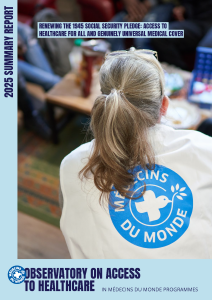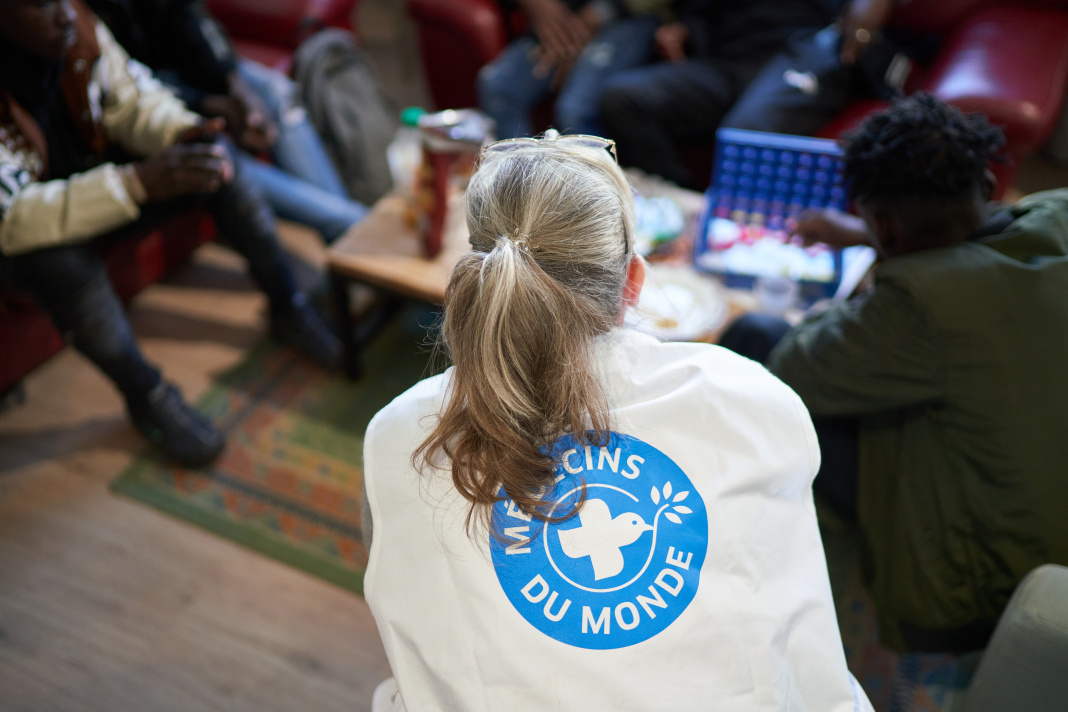In 1945, the French Social Security (sécurité sociale) system was established with a bold ambition: to ensure social coverage throughout every stage of life; to make health a common good by socialising the risk of illness through collective and solidarity-based funding. Eighty years later, Médecins du Monde made an unequivocal assessment in its 2025 Observatory report on access to rights and healthcare: for many people living in precarious situations, access to comprehensive, continuous or effective health cover continues to be an uphill battle.
85% of people who were seen in our healthcare centres do not have any healthcare coverage
The 2024 health barometer, based on more than 15,000 people who were seen in our healthcare centres in France, highlights their profiles and state of health. The barometer reveals that 85% of people do not have any healthcare coverage, although nearly four out five is entitled to medical insurance. This results in delayed or foregone medical care, with direct consequences for health: untreated chronic illnesses, worsening of existing conditions, and more costly complications requiring hospital treatment.
The thematic focus of the report is dedicated to inequalities of access to medical cover in the context of the 80 years anniversary of the French social security
It lays out the administrative obstacles and practices hindering effective access to medical coverage, drawing from the data of carried out follow-ups, flash surveys conducted in several regional offices and accounts of the people received.
The first issue is domiciliation: with no fixed home address, entitlement cannot be secured (chapter 1). In 2024, 28% of people seen by MdM say they do not have a fixed address. In some municipalities, refusals of administrative domiciliation are frequent and often discriminatory: in Île-de-France, 46% of the municipal social action centres (CCAS in French) surveyed refuse to register people living in slums, 54% those living in squats, and 57% those living on the streets. In Médoc as in Île-de-France, 4 out of 10 CCAS illegally refuse requests for administrative domiciliation in the absence of a residence permit.

The closure of physical reception offices and the digitisation of administrative procedures are leaving many people behind (chapter 2). In Rouen, 44% of people surveyed upon leaving the health insurance agency (Assurance maladie) had given up at least once on completing an online procedure over the past 12 months, due to lack of equipment, lack of digital skills, or excessively long processing times. Even at the service desk, half of the reported difficulties were only partially resolved, or not resolved at all. The Maisons France Services, presented as local support centres, only partially compensate for the gradual withdrawal of health insurance services (Assurance maladie) as shown by our survey in Haute-Garonne. As for AME (State Medical Aid) beneficiaries, they are particularly affected by digitalisation: insufficient territorial coverage of authorised service desks for applications, mandatory appointments in some departments, lack of information about their rights, absence of interpreting services, and poor quality of responses provided by the health insurance call centres.
Universal Health Protection (Protection universelle maladie) was meant to guarantee the right to health for everyone (chapter 3). Yet in 2024, nearly four out of five people met in our centres, although eligible, had no active health coverage. The Complémentaire santé solidaire (C2S) remains poorly known and overly complex, with a high rate of non-take-up. Foreign nationals or people in precarious situations face delays, interruptions in their rights, and administrative restrictions. Even State Medical Aid (AME) remains difficult to access and discriminatory. A survey conducted among all dentists in Montpellier shows that 38% of clinics refuse to give appointments to AME beneficiaries, while they accept patients with a carte vitale who have the same needs.
Speaking out — but also offering solutions and taking action
In light of these findings, the report goes beyond simply denouncing the situation: it puts forward concrete solutions. In the short term, these include strengthening the effectiveness of rights through a genuine public domiciliation service, universal access to health insurance, and improved access to comprehensive healthcare coverage. In the medium term, it advocates for a structural reform: the creation of a single public health coverage system — universal, comprehensive, and with no out-of-pocket costs — based on residency and merging all existing schemes, in order to truly guarantee the right to health for everyone (chapter 4). This means returning to the founders’ promise of 1945 and engaging in a democratic debate to build, together with users, citizens, and professionals, the health protection system of the 21st century. This report is much more than an analytical document. It is the result of Médecins du Monde teams’ field observations and serves as a tool to strengthen our collective advocacy. By using it, sharing it, and enriching it with your feedback, you help turn individual testimonies into collective strength and advance the vision of truly universal healthcare.
Eighty years after the founding of Social Security, this report highlights that achieving universal access to healthcare remains an ongoing challenge — one that requires collective commitment to make access to health a lived reality for all.


